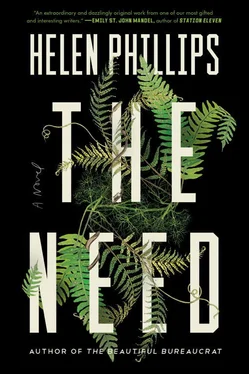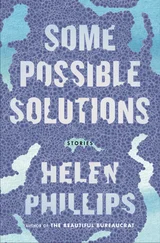But the extent of her bravery was to call Corey.
“Wait did you leave?” Corey said. “Roz was just—”
“Is there a woman in a black car in the parking lot?”
“I’m in my office.”
“Can you go and check?”
“Sure.”
She waited.
“Corey?”
“Just a sec. I just have to send this email.”
“Please, quick, check, right now. But stay inside. Don’t go outside. Okay?”
“Molly! Okay, okay, okay. Okay, I’m walking to the front. Okay, I’m looking at the parking lot.”
“And?”
“Yep. Black car. About to park.”
“Is she wearing a sweatshirt?”
“Wait, never mind. Not parking. Just passing through.”
Just passing through.
“Is she wearing a sweatshirt?”
“I’m not even sure she’s a she. But anyway it’s leaving now.”
Molly did pull a U-turn then, but by the time she was back in front of the Phillips 66 parking lot, there was no black car in sight.
She pulled a second U-turn. She was making herself dizzy.
She opened all the windows in the hope that the wind would clear her head, but it just increased the dizziness. She closed the windows. But that was too airless. She opened them again.
Stopped at a red light, she watched a woman with a baby in a carrier in the crosswalk. The woman was missing both forearms. Molly was filled with pity (How would you bathe it, nurse it, put it to bed?) until the angle changed and she realized the missing forearms had been a trick of her eyes.
She kept waiting for the bloody clothing to shimmer or disappear or otherwise start to seem less real than the corresponding clothing she was wearing.
But it remained there on the passenger seat, spilling out of her bag, unchanging, inactive: real.
That blood was the blood of her children.
That’s what it was.
She could take it to a lab, get it tested, find out if the DNA matched.
She made a left where she should have made a right, drove toward the reservoir. The day was still gray and white. There was green in places, blue in places, but what she saw was the gray and the white. She parked in the turnabout beside the bridge and cradled the clothing as she walked to the middle of the bridge, acutely aware of the two wet patches of milk on her chest.
She hesitated only an instant before hurling the clothes into the water. The cars and trucks rushed behind her, loud and divinely indifferent.
She thought she would feel relieved but she did not feel relieved.
There was one other pedestrian on the bridge, a gaunt man with a small camera. He stared at her. Then he pointed his camera straight up and took a picture of the sky.
The children were cranky. Maybe everyone would be better off if Erika had stayed until the appointed time. If Molly, after parting with the clothes, had continued to drive dizzy around the gray and white world with the wind in the car.
But at least today she had not been usurped by Moll.
She couldn’t stand her phone, the long record of missed calls and declined video chats and neglected texts from David. She couldn’t stand the cluttered surface of her home desk, all the unopened mail, couldn’t stand to glance at her email, the untended in-box overgrown with notifications from Viv’s school and pleas from good causes and notes from various people she knew. How exotic, outrageous, the normal business of life.
As soon as one child stopped whining, the other child would begin whining. And then, sometimes, a duet.
She needed to make a plan, some way to navigate these hours, to distract the children enough that she could let her thoughts run along their own fretful tracks.
The plan was: Let’s go and sit on the front steps and count the passing cars. Like watching paint dry. Okay, but a plan is a plan. A plan is power, anticipation, kids jumping up and down, clapping their hands, no matter how feeble the plan.
“We’re going to the steps! To count cars!” Viv shepherded Ben to the front door.
“Bebock,” Ben said.
“What?” Molly said.
“Bebock,” he said.
“Come on,” Molly said, rushing them though there was no rush. Just the rush to escort them into a few minutes of peace.
They were both, finally, out the door. She pulled it shut behind them, wanting to draw a solid line between the place where they had been cranky and the place where they would no longer be cranky.
The door would not close. She yanked harder. There was resistance, something preventing it from shutting the final half centimeter, maybe a strong draft blowing through the house? Maybe a toy jammed on the other side of the hinges? Maybe someone pulling on the door with equal force from the opposite side?
Or, she realized only as Ben’s howl took root in his bowels and rose upward: Ben’s right ring finger, somehow lodged in just the wrong place, the place that she had been clamping with all her force.
In horror she reopened the door, releasing the finger, and both she and Viv descended upon him in a fruitless effort to comfort. For a long time the three of them were suspended in a moment from which there was no escape: the shrieking boy, the terrified sister, the guilty mother.
The finger seemed fine.
Or so she told herself. He wouldn’t let her get a good look at it.
After a while, the sound of bagpipes could be heard a long way off.
“What’s that?” Viv said, lifting her head from the spot where she had nuzzled into Molly’s shoulder.
“Bagpipes,” Molly explained to Viv over the noise of Ben’s weeping.
Slowly the bagpipes drew closer. Ben stopped crying. He listened.
“He should have said ‘Excuse me’ to the door. Right, Mom? If he had said ‘Excuse me’ to the door this wouldn’t have happened.”
Ben crawled into Molly’s lap and stood on her legs and wrapped his arms around her neck and let her whisk the tears off his face. He tugged at her shirt. Her unmarred black shirt. She lifted it so he could nurse.
“…up above the world so high, like a diamond in the sky…,” Viv sang along with the bagpipes.
It sounded weird, “Twinkle, Twinkle, Little Star” on the bagpipes.
Still nursing, Ben opened and closed his fingers for the twinkle part, as Viv had trained him to do. His right ring finger moving just as well as the others.
“Am I going to see the pagbipes?”
“Bagpipes. Yes. This is your first time ever seeing them I think.” Yet another item on the near-infinite list of things to which she had introduced Viv.
“And then her mother took her to the ruined schoo-oo-ool!” Viv sang along with the next verse.
“What?”
“And then her mother took her to the ruined schoo-oo-ool!” Viv continued.
“Who told you those words?”
“Made them up.”
The sound of the bagpipes came ever nearer. The musician turned the corner. A young woman. She was not playing the bagpipes. She was playing a reed instrument that Molly didn’t recognize.
“Bagpipes!” Viv said.
Viv wanted to go into Ben’s crib with him so they could pretend to be newborns. As Molly lifted them in (thinking that she was not doing a very good job, that in a mere twenty minutes she had wounded the baby and misinformed the child), her foot came into contact with something bulky beneath the crib.
Her big old brown duffel bag, shoved into the shadows, packed so full its contents strained the zipper.
“Why’s the suitcase under here?” Molly said. “What’s in it?”
Viv looked at her strangely.
“Everything we put in it, of course,” she said.
“Toys?”
“Mom, you know.”
Molly reached for it.
“Leave us alone!” Viv said. “Close the door!”
Читать дальше





![Unknown - [Carly Phillips] The Bachelor (The Chandler Brothe(Bookos.org) (1)](/books/174132/unknown-carly-phillips-the-bachelor-the-chandle-thumb.webp)






